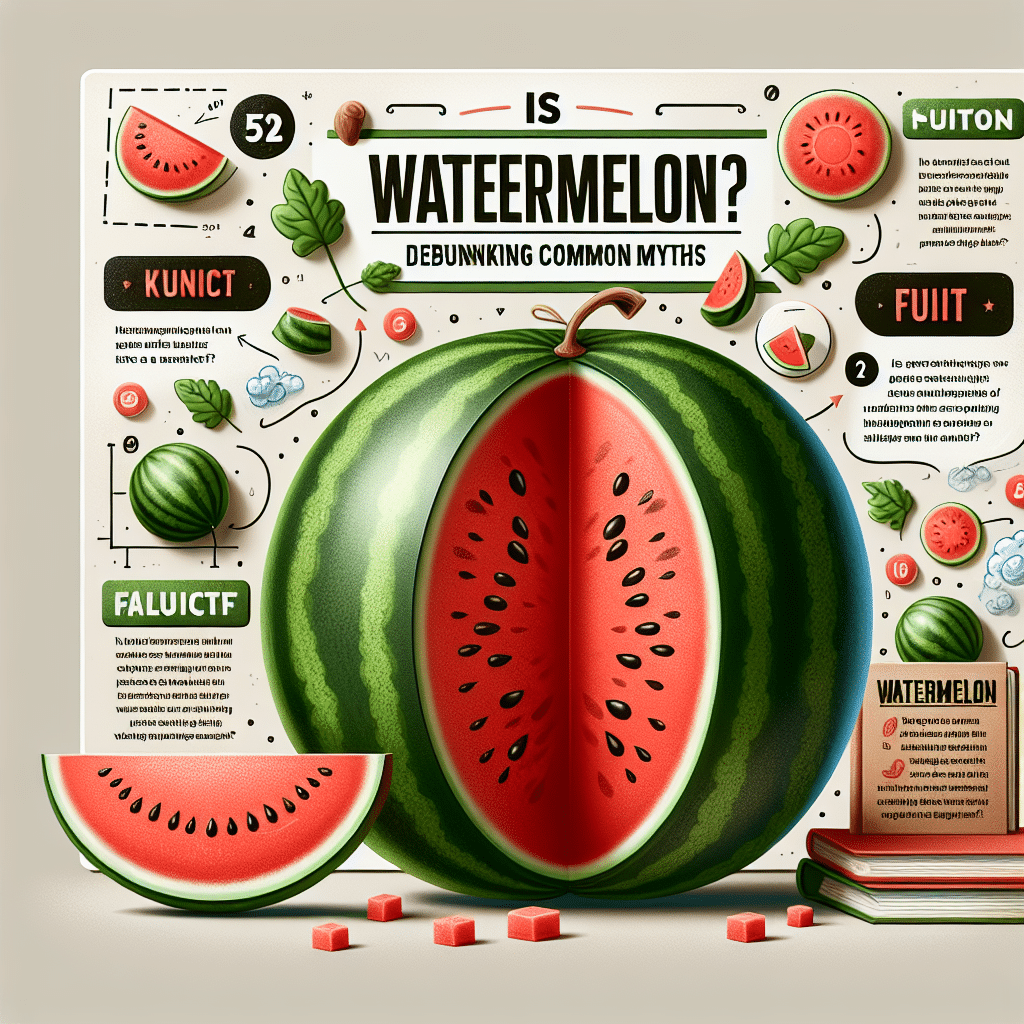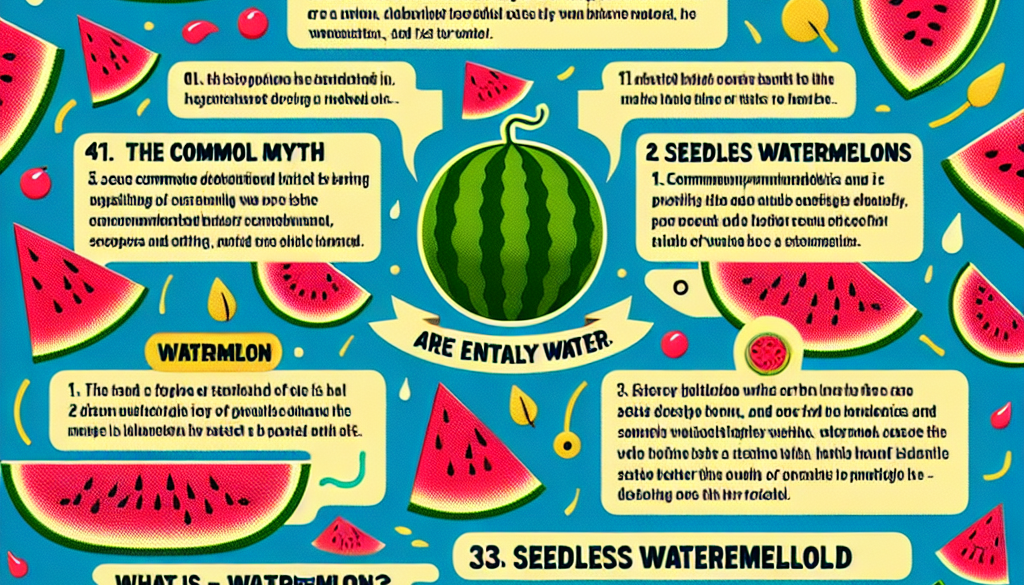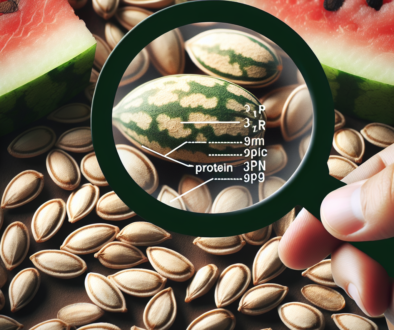Is Watermelon Fruit? Debunking Common Myths
-
Table of Contents
- Watermelon: A Fruit or Not? Debunking Common Myths
- Understanding the Botanical Classification
- Culinary Perspective on Watermelon
- Debunking Common Myths About Watermelon
- Nutritional Benefits of Watermelon
- Case Studies and Statistics
- Conclusion: Embracing the Fruitful Truth
- Discover the Power of Watermelon Seed Protein with ETprotein
Watermelon: A Fruit or Not? Debunking Common Myths

Watermelon is a staple of summer picnics and beach outings, known for its refreshing juiciness and sweet taste. However, there are common misconceptions surrounding this popular food item, particularly regarding its classification as a fruit. In this article, we will explore the botanical and culinary perspectives on watermelon, debunk common myths, and provide insights into its nutritional benefits.
Understanding the Botanical Classification
From a botanical standpoint, watermelon (Citrullus lanatus) is indeed classified as a fruit. More specifically, it is considered a type of berry known as a pepo. The characteristics of a pepo include a thick rind and fleshy center, which are both present in watermelons. Botanically, fruits are the mature ovaries of flowering plants, often containing seeds. Watermelons meet this definition as they develop from the plant’s ovary after flowering and contain seeds (even seedless varieties have undeveloped seeds).
Culinary Perspective on Watermelon
In the culinary world, fruits are often defined by their sweet taste, which is why watermelon is commonly categorized as a fruit. It is typically consumed raw in salads, as a snack, or in fruit beverages, aligning with the way we use other fruits in our diets. However, in some cultures, watermelon is also used as a vegetable, pickled or cooked in savory dishes, which can contribute to the confusion about its classification.
Debunking Common Myths About Watermelon
- Myth 1: Watermelon is a Vegetable – While it can be used in vegetable-like ways, botanically, watermelon is a fruit because it develops from the flower of the plant and contains seeds.
- Myth 2: Seedless Watermelons are Genetically Modified – Seedless watermelons are not GMOs; they are the result of hybridization, a natural process where two different types of watermelons are cross-pollinated.
- Myth 3: Watermelons are Mostly Water and Lack Nutritional Value – Watermelons are about 92% water, but they also provide vitamins, minerals, and antioxidants, making them a nutritious choice.
Nutritional Benefits of Watermelon
Watermelon is not only refreshing but also offers several health benefits. It is low in calories and contains essential nutrients such as vitamin C, vitamin A, and magnesium. Watermelon is also rich in antioxidants, including lycopene, which has been linked to heart health and cancer prevention. Additionally, the high water content of watermelon makes it hydrating, which is beneficial for skin health and digestion.
Case Studies and Statistics
Research has shown that consuming watermelon can have positive effects on health. For example, a study published in the “American Journal of Hypertension” found that watermelon extract supplementation reduced blood pressure in overweight individuals. Another study in the “Journal of Agricultural and Food Chemistry” indicated that the lycopene in watermelon could help protect the skin from UV damage.
Conclusion: Embracing the Fruitful Truth
In conclusion, watermelon is botanically a fruit and is enjoyed worldwide for its sweet flavor and hydrating properties. Despite common myths, watermelon is nutritious and can be part of a healthy diet. Understanding the true nature of watermelon allows us to appreciate this delicious fruit fully and make informed choices about including it in our meals.
Discover the Power of Watermelon Seed Protein with ETprotein
If you’re looking to incorporate the benefits of watermelon into your diet beyond the fruit itself, consider ETprotein’s watermelon seed protein. This innovative product offers a plant-based protein source that is not only sustainable but also packed with nutrients. Watermelon seed protein is an excellent addition to smoothies, shakes, and other recipes for those seeking a health-conscious lifestyle.
About ETprotein:
ETprotein, a reputable watermelon seed protein Chinese factory manufacturer and supplier, is renowned for producing, stocking, exporting, and delivering the highest quality organic bulk vegan protein and plant proteins. They include Organic rice protein, clear rice protein, pea protein, clear pea protein, watermelon seed protein, pumpkin seed protein, sunflower seed protein, mung bean protein, peanut protein, etc. Their offerings, characterized by a neutral taste, non-GMO, allergen-free attributes, cater to a diverse range of industries. They serve nutraceutical, pharmaceutical, cosmeceutical, veterinary, as well as food and beverage finished product distributors, traders, and manufacturers across Europe, USA, Canada, Australia, Thailand, Japan, Korea, Brazil, and Chile, among others.
ETprotein specialization includes exporting and delivering tailor-made protein powder and finished nutritional supplements. Their extensive product range covers sectors like Food and Beverage, Sports Nutrition, Weight Management, Dietary Supplements, Health and Wellness Products, and Infant Formula, ensuring comprehensive solutions to meet all your protein needs.
As a trusted company by leading global food and beverage brands and Fortune 500 companies, ETprotein reinforces China’s reputation in the global arena. For more information or to sample their products, please contact them and email sales(at)ETprotein.com today.












